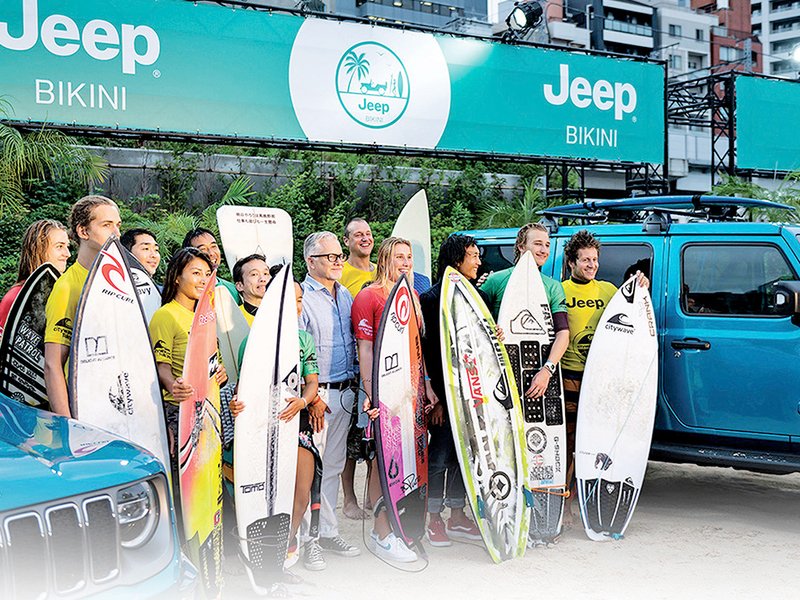
TOKYO — How does a Detroit automaker sell American vehicles in Japan’s notoriously fickle, hyper-competitive and supposedly closed market? Actually, if you’re Jeep, you do it quite well.
Jeep posted a 16 percent sales surge in Japan last year, making it one of the fastest-growing brands in the world’s No. 3 auto market. In posting its sixth year of back-to-back growth since 2013, Jeep also bucked a trend of slumping overall sales in Japan and falling demand for imports.
Granted, Jeep’s volume is still pretty paltry. It sold just 13,360 vehicles here in 2019.
But its success in a market that has been a nonstarter for U.S. automakers and a perennial flashpoint of U.S.-Japanese trade tensions offers a convincing counternarrative to the oft-repeated refrain that the Japanese just won’t buy American.
Indeed, the next-best Detroit contender, Chevrolet, saw sales tumble 33 percent to just 585 vehicles in 2019 — fewer than Lamborghini. And Ford Motor Co. quit the Japan market in 2016.
But Jeep keeps climbing higher here — sales have surged sevenfold over the past decade, from 1,877 vehicles in 2010. Jeep’s blueprint calls for tailoring product to Japanese tastes, investing heavily in retail upgrades and having a whole lot of patience, FCA Japan CEO Pontus Haggstrom said.
But the iconic American off-road marque also doesn’t hammer too hard on its roots.
“I don’t know if we have redefined the notion of American cars in Japan. I hope we have,” Haggstrom said last week. “The cars are not overpriced gas guzzlers with no quality — you know the perception. But we also, to be honest, don’t really push the American heritage that much.”
Jeep’s proposition in Japan is its reputation as the brand that invented SUVs.
And the pitch works. Jeep drives FCA in Japan, accounting for 54 percent of the manufacturer’s sales. Jeep fueled a 9.9 percent increase in overall FCA Japan sales to 24,666 units in 2019, despite a 1.5 percent decline in Japan’s passenger vehicle market and a 3.2 percent slip for import brands.
“The main reason for our growth has been the sales movement of the Jeep brand,” Haggstrom said, noting that Jeep’s sales growth rate was twice that of the overall crossover segment here.
Wrangler is Jeep’s hero nameplate. It sold nearly 5,000 in Japan last year. Sales of the brand’s standard-bearer have posted a ninefold increase over the last decade, from just 516 in 2009. But in 2019, the Grand Cherokee and the compact Renegade also notched record results. Haggstrom said he expects Jeep and FCA to book another record year in 2020. He declined to give a target but said Jeep should surpass 14,000 vehicles, and that FCA would eclipse 25,000.
In Japan, FCA also sells the Fiat and Alfa Romeo brands, as well as Abarth as a stand-alone marque.
Jeep, which routinely ranks as one of the top 10 import brands here alongside the Germans, has focused on a long game that other Detroit brands have had only sporadic patience for. It starts with attention to obvious details, such as making sure to offer right-hand-drive vehicles — an initiative sometimes dismissed in the past as too costly by Detroit’s brands.
Jeep also started a costly, multiyear retail-network upgrade that gradually expanded the number of dealerships. Jeep had 80 shops here last year, up from 76 in 2016. And the brand renovated 57 of the showrooms by last year, compared with just seven in 2016. This year, Jeep plans to expand to 90 dealerships, 75 of which will be renovated or new.
FCA Japan as a whole has also invested in a double-digit increase in sales and service staff since 2015. And because Japan is experiencing a labor shortage, FCA this year will begin recruiting technicians from Southeast Asia to work in its Japanese retail network, Haggstrom said.
Meanwhile, FCA is keeping its Japan lineup fresh with limited editions. This year, it will offer a two-door Wrangler Rubicon for the first time. That will be one of 45 special editions introduced here in 2020, about half of which are unique to the local market.
“We have managed to grow our business in Japan threefold in the last decade,” Haggstrom said. “Which other importer or brands come close to this?”
The answer is not many. Volvo posted a small gain, and so did PSA, the French automaker working out a merger with Jeep’s parent company FCA.
“It is nice that we are combining two successful groups,” Haggstrom said of PSA.
Meanwhile, the FCA boss downplays the impact of trade barriers on sales success in Japan. Japan eliminated import tariffs decades ago, he notes, unlike the U.S., which keeps them on cars and trucks.
The bigger headaches are local regulations that import brands must meet, such as unique crash tests for electrified vehicles, or different bandwidth for keyless entry fobs. Adapting the foreign vehicles adds time and expense to bringing them to the market.
“They are not a major hindrance. They are just a nuisance,” Haggstrom said. “To grow like we have done requires some investment and determination.”